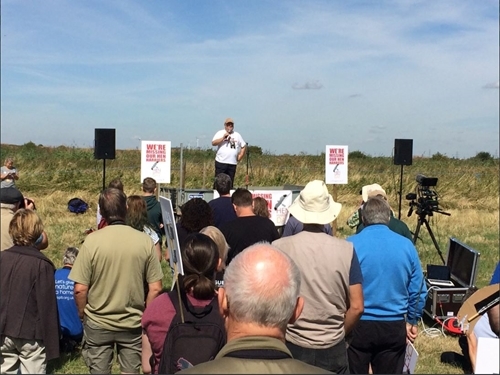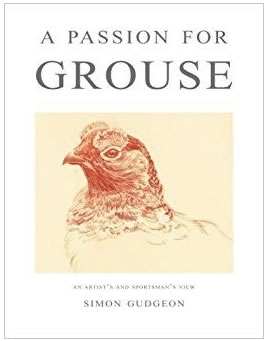
Former RSPB Conservation Director Mark Avery speaking at Hen Harrier Day
Meeting at a nature reserve beside the Thames Estuary may sound a strange place to discuss our uplands but there is a link – both have peat underneath and at one time had trees on top. Few saw the irony of standing in a landscape that has been ecologically ravaged, listening to speeches about our globally important heather moorlands (as ratified in the 1992 Rio Convention).
Sadly, most of the time was spent demonising grouse shooting rather than recovering our harriers, watch it here. It was hard to see how the cessation of shooting on Ilkley moor by Bradford Council here can be seen as a victory for hen harriers (they hardly flocked there the last time the lease was terminated) but it got Natalie Bennett (Green Party) a cheer anyway. Barry Gardiner MP offered us one pledge that in him ‘there will always be someone championing research about driven grouse shooting and its impact on the countryside’. That’s great news but let’s consider what was not discussed.
Why is the RSPB afraid of success?
Even though the RSPB were hosting the hen harrier event they appeared reluctant to admit anything that might upset the 150 people there (even when 20 of them were their own staff). Not one speaker could admit that this has been the best year for hen harriers in a decade nor the RSPB view that “they have increased from a historical low 100 years ago”here.
RSPB is in ‘no doubt’ grouse moors can be a force for good
The RSPB agree that gamekeepers can benefit other ground-nesting birds and that grouse moors have been a force for good in preventing wider forestry plantations and over grazing by sheep here. They are also clear that “grouse moors, in conservation terms, are not inherently a bad thing” here. Unfortunately, they appear embarrassed to share these facts with those at Hen Harrier Day. Their own Vice President Chris Packham appears completely unaware of the organisations assessment by calling for a ban here.
Natalie Bennett appeared equally confused about the National Trust’s position on grouse shooting. She enjoyed cheers when she stated they had terminated a shooting lease here but appeared unaware they replaced it with three new grouse shooting leases here a ‘decision based on what we [National Trust] think is best for nature’ here. Other speakers know all these points but tellingly none dared to mention them. Even Mark Avery appeared to have forgotten that when he worked at the RSPB he said ‘Grouse moors undoubtedly provide good habitat for species in addition to grouse’ here.
61 pairs - favourable conservation status of hen harriers in England
As explained on the RSPB website here this target was set by the JNCC seven years ago. Instead it has become fashionable to just quote 300 pairs without explaining this is an estimate of the maximum possible number based on the available habitat (but does not consider food availability or predation). Nor is it fashionable to mention that only 50% of the available habitat is not managed by gamekeepers. Two years ago there were three hen harrier nests at the RSPB’s flagship upland reserve at Geltsdale. Nobody dared mention that there were none this year, but it would have been interesting to understand if there have been any habitat changes, to accommodate other species, which may have been detrimental to the hen harrier.
14 nesting attempts of which nine were successful in 2018
The data is published by Natural England here. Even though this represents 20% of the favourable conservation target, the RSPB conservation director, Martin Harper, described this as ‘a little bit of progress’. I think he was being modest. We must congratulate the RSPB for demanding the government write a hen harrier action plan that was endorsed by the grouse moor owners here. This is the first year the whole plan has been available and it would be fair to say the results have been stunning.
34 chicks from 9 nests this year
Despite the fledgling success being 80% higher than a similar sized nest study in Ireland here it was curious that there was no mention of this. It would have been helpful to know more – were stoats being trapped near the nesting sites by any chance?
60% of chicks fledged from grouse moors
The fact that 60% of the fledged chicks came from grouse moors was not mentioned even though they only had 50% of the nests. Plenty of mentions that these new harriers would need careful monitoring through tags (also part of the action plan) but no mention that we might expect a 70% natural mortality of hen harriers in their first year. Without this detail every harrier lost will be met with outrage on social media.
The hen harrier brood management scheme is a persecution avoidance scheme
The RSPB call the brood management scheme ‘a persecution avoidance scheme’ on their website here. They should know because as they say, ‘the RSPB played a full part in the production of Defra’s Hen Harrier Action Plan’ here. Since they have committed to supporting those elements of the plan ‘designed to reduce illegal killing of birds of prey’ here you might be surprised they are still trying to stop it here. This is a conservation technique currently in use for numerous other species around the world and in this country here. There was no discussion about why we should not test something that can only serve to swiftly increase hen harrier numbers.
Nest protection is not enough
It is six years since the RSPB acknowledged that nest protection is not enough here and called for the government to write the hen harrier action plan. It is right that those involved in nest protection must be congratulated but it is equally wrong to suggest this year’s success can be attributed to this alone. If the RSPB really believe this level of success can be attributed to nest protection, why are they still saying hen harrier recovery requires grouse moors to be licenced?
It is two years since the RSPB said hen harrier recovery will only come through the licensing of grouse moors here. It would have been good to hear how this mechanism would work better than the six-part hen harrier plan. Sadly, there was nothing about this so we are left with their written submission to MPs which said it would be like ‘the Environment Agency Rod Licensing system’ here. This does not explain how it would be any better, but I am sure those hoping for hen harrier recovery would have been interested to know.
Predator control
The reserve at RSPB Rainham Marshes in Essex is ringed by an impressive predator control fence. They are very proud of it because, as we were told, is responsible for the rise in birds on the reserve. However, such fences are not practical in their upland reserves so the RSPB cull the foxes and crows to protect curlew. This is an important policy but their global conservation director, Martin Harper, found himself defending it last week on the BBC Today programme here and again at lunch time on the BBC Jeremy Vine show here. Why? Because they rarely explain conservation involves predation control as well as habitat management.
Revealingly, his predecessor, Mark Avery, shared what he thought when he heard the Today interview, ‘glad I am not doing that’. This neatly sums up the situation. The activists marching the RSPB to the top of hills are only too willing to abandon them when it unravels. This has happened on curlew and I think, if we continue like this, it will happen on hen harriers in the future.
Andrew Gilruth
Director of Communications at GWCT
Get 50% off 'A Passion for Grouse'

Don't miss this fantastic opportunity to grab a copy of this beautifully illustrated book for just £5.
This comprehensive hardback guide to the grouse includes details of its life and moorland habitat, gamekeeping, the sporting season, other moorland wildlife and grouse recipes.
Offer ends Friday 17 August.
Buy now >